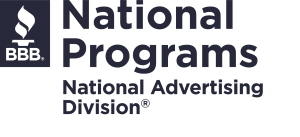
New York, NY – Nov 30, 2022 – The National Advertising Division (NAD) of BBB National Programs determined that Perrigo Company plc provided a reasonable basis for certain cost savings claims for its store brand hypoallergenic infant formula but recommended that other challenged claims be modified or discontinued.
Mead Johnson & Company (MJ), manufacturer of the competing Enfamil Nutramigen formula, challenged claims relating to Perrigo’s generic extensively hydrolyzed casein formula, one that is designed for infants with a cow’s milk allergy and is sold by various retailers under their respective store brands. The Perrigo claims appeared in consumer and pediatrician-directed websites, as well as in pediatrician-directed print advertising, and range from unqualified assertions of Perrigo’s store brand formula being more affordable to specific cost savings calculated according to Perrigo’s price-per-pound calculations.
At issue before NAD was whether Perrigo’s price comparison claims between its generic store brand hypoallergenic infant formula and Nutramigen are truthful and non-misleading.
Percentage Savings Claims
Based on IRI Market Advantage annual retail sales data and Perrigo’s price calculations on each container’s price per ounce, NAD found the following claims supported:
- “Store Brand Hypoallergenic Infant Formula costs less, allowing families to save at least 22% … compared to leading name brands”; and
- “The chart with the claim “provides the best value for hypoallergenic infant formula … at least 22% of savings.”
NAD also determined that the advertiser’s evidence, a double-blind, randomized crossover clinical study, provided a reasonable basis to support the claim that Perrigo’s store brand formula is nutritionally comparable to leading name brand hypoallergenic formulas.
Monthly Savings Claims
NAD determined that the IRI retail sales data and Perrigo’s calculations provide a reasonable basis to support:
- The advertiser’s daily, weekly, monthly, and annual savings claims comparing Perrigo to Nutramigen;
- The bar graph titled “At Least $75 in Savings Per Month” depicting Similac Alimentum as costing $250 per month, Enfamil Nutramigen as costing $252 per month, and Perrigo Store Brand Hypoallergenic Formula as costing $173 per month; and
- The claim that “families who switch from expensive name brand formula to Store Brand infant formula can save approximately $62 monthly” as it relates to hypoallergenic However, NAD found that the second part of that claim “which can help cover more than half the cost of diapers” was not supported and recommended that portion of the claim be discontinued with respect to hypoallergenic formulas.
NAD concluded that disclaimers referencing 2021 sales data that qualify the $75 monthly savings claims should be modified to ensure they are clear and conspicuous and placed in close proximity to the claims they qualify.
Affordability Claims
Based on IRI retail sales data and Perrigo’s price calculations, NAD found the following claims supported:
- The general “more affordable” claim;
- “Parents deserve a more affordable hypoallergenic option and now they have one”;
- “Finally, you can now recommend a more affordable option for your families”; and
- “The cost comparison in the claim “parents deserve a safe effective and lower-cost hypoallergenic infant formula that meets the same high-quality standards as expensive name brands. And as their pediatric provider, you can now recommend a more affordable option with confidence.”
However, NAD determined that “the same high-quality standards as expensive name brands” conveys a broader message of equivalence that is not supported by the advertiser’s clinical study. Therefore, NAD recommended that this portion of the claim be modified to clearly state that Perrigo meets standards for AAP hypoallergenicity.
NAD also found that an unsupported message of broad equivalence between generic hypoallergenic formulas and brand name hypoallergenic formulas is reasonably conveyed by the claim “you can’t put a price on health and nutrition, but there’s no reason to pay a premium just for the name on the label.” Therefore, NAD recommended that the claim be discontinued or modified to avoid conveying such a message.
Implied Claim
NAD found that the implied claim caregivers will spend less money on hypoallergenic formula over the course of their infant’s cow’s milk allergy if they use Perrigo’s store brand formula instead of Nutramigen is supported. NAD noted that cow’s milk allergy infants need to consume hypoallergenic infant formula as a replacement for regular formula or breast milk, and the pricing evidence demonstrates that Perrigo hypoallergenic formula costs less than Nutramigen.
Finally, NAD considered whether MJ’s evidence shows that Nutramigen offers materially different benefits than Perrigo products such that Perrigo’s price comparisons between the infant formulas are inherently misleading. When evaluating health claims especially in the context of infant nutrition NAD requires competent and reliable scientific evidence including when that evidence is used to rebut the advertiser’s evidence that establishes a reasonable basis to support its advertising claim. After considering all the data in the record, NAD determined that MJ has not provided stronger, more persuasive evidence reaching a different result than the evidence provided by Perrigo.
In its advertiser statement, Perrigo stated that it “will comply with NAD’s recommendations.” The advertiser further stated that while it “disagrees” with NAD’s recommendations regarding its advertising, “Perrigo respects the self-regulatory process, and appreciates the NAD’s decision and careful analysis.”
All BBB National Programs case decision summaries can be found in the case decision library. For the full text of NAD, NARB, and CARU decisions, subscribe to the online archive.
About BBB National Programs: BBB National Programs is where businesses turn to enhance consumer trust and consumers are heard. The non-profit organization creates a fairer playing field for businesses and a better experience for consumers through the development and delivery of effective third-party accountability and dispute resolution programs. Embracing its role as an independent organization since the restructuring of the Council of Better Business Bureaus in June 2019, BBB National Programs today oversees more than a dozen leading national industry self-regulation programs, and continues to evolve its work and grow its impact by providing business guidance and fostering best practices in arenas such as advertising, child-directed marketing, and privacy. To learn more, visit bbbprograms.org.
About the National Advertising Division: The National Advertising Division (NAD) of BBB National Programs provides independent self-regulation and dispute resolution services, guiding the truthfulness of advertising across the U.S. NAD reviews national advertising in all media and its decisions set consistent standards for advertising truth and accuracy, delivering meaningful protection to consumers and leveling the playing field for business.
Contact Information
Abby Hills
Director of Communications
BBB National Programs
703.247.9330 / press@bbbnp.org
National Advertising Division Refers Comparative Advertising Claims made by Zscaler to Federal Trade Commission for Further Review
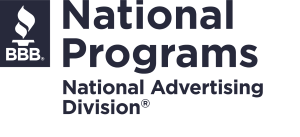
New York, NY – November 30, 2022 – The National Advertising Division (NAD) of BBB National Programs has referred advertising claims made by Zscaler, Inc. to the Federal Trade Commission (FTC) after the company failed to respond substantively to a challenge into claims made for its Zero Trust Exchange Platform. NAD recommended that Zscaler discontinue claims about various privacy protection attributes and benefits of its Zero Trust Exchange platform versus the technical capabilities of Prisma Access, the platform of challenger Palo Alto Networks.
Although Zscaler contended that NAD did not have jurisdiction to consider this challenge, NAD determined that, pursuant to NAD/NARB Procedures, it has jurisdiction over the advertising claims at issue in this case because:
- A non-disclosure agreement between the advertiser and an entity not party to these proceedings did not protect advertising claims contained within a marketing brochure from NAD’s review, although the advertiser argued the challenger tortiously interfered with a third-party confidentiality agreement. For policy reasons, it is important that advertisers not use a cloak of confidentiality to hide misleading advertising.
- The marketing brochure in which the challenged claims appear is a carefully prepared seventeen-page document with extensive design elements that suggest it was intended for broad dissemination. The advertiser acknowledged that it was provided to multiple recipients to promote the benefits of Zscaler’s security platform and, as a result, constitutes national advertising as defined in NAD/NARB Procedures.
NAD routinely considers challenges involving highly complicated technologies from many industries without issue and concluded that the issues in this case are not so technical that they are beyond NAD’s review.
Because Zscaler did not submit any argument or evidence to support its claims on the merits, the NAD/NARB Procedures allow NAD to conclude that Zscaler failed to meet its burden of providing a reasonable basis for its claims.
NAD/NARB Procedures further require advertisers to state in writing at the close of the case whether they intend to comply with NAD’s recommendations or appeal NAD’s findings. Zscaler declined to submit this written statement. Therefore, pursuant to NAD/NARB Procedures, NAD referred this case to the FTC and other regulatory authorities for review and possible enforcement action.
All BBB National Programs case decision summaries can be found in the case decision library. For the full text of NAD, NARB, and CARU decisions, subscribe to the online archive.
About BBB National Programs: BBB National Programs is where businesses turn to enhance consumer trust and consumers are heard. The non-profit organization creates a fairer playing field for businesses and a better experience for consumers through the development and delivery of effective third-party accountability and dispute resolution programs. Embracing its role as an independent organization since the restructuring of the Council of Better Business Bureaus in June 2019, BBB National Programs today oversees more than a dozen leading national industry self-regulation programs, and continues to evolve its work and grow its impact by providing business guidance and fostering best practices in arenas such as advertising, child-directed marketing, and privacy. To learn more, visit bbbprograms.org.
About the National Advertising Division: The National Advertising Division (NAD) of BBB National Programs provides independent self-regulation and dispute resolution services, guiding the truthfulness of advertising across the U.S. NAD reviews national advertising in all media and its decisions set consistent standards for advertising truth and accuracy, delivering meaningful protection to consumers and leveling the playing field for business.
Contact Information
Abby Hills
Director of Communications
BBB National Programs
703.247.9330 / press@bbbnp.org
IFSI Announces USDA Maize Collection Donation
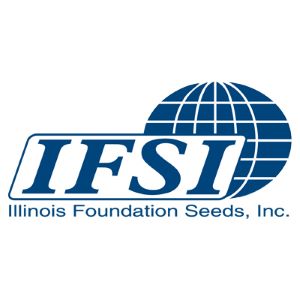
Illinois Foundation Seeds, Inc. Announces Donation to USDA Maize Collection
Illinois Foundation Seeds, Inc (IFSI) continues its long-standing commitment to supporting the agriculture industry and the United States Department of Agriculture (USDA). IFSI recently announced a multi-year series of donations to the USDA Maize Collection in Iowa.
The donations involve supplying past, IFSI-developed inbreds to the USDA’s Maize Collection housed at the Ames, Iowa facility. In 2022, IFSI will release 66 inbreds with full descriptions and molecular marker data. In 2023, the company will release an additional 44 inbreds. Approximately 48 additional inbreds will be released beginning in 2024 and beyond. The inbreds will be grown at the North Central Regional Plant Introduction Station (NCRPIS) for distribution beginning no earlier than 2024. A list of the accessions donated can be reviewed here: https://npgsweb.ars-grin.gov/gringlobal/cooperator?id=184890 (The list at this link will update as more accessions are donated to the collection.)
Inbreds are lines of identical or virtually identical entities considered genetically pure. Corn hybrids derive from inbred corn lines. The foundation of successful breeding is diversity of inbreds.
“IFSI hired Dale Cochran in 1965 as our first Corn Breeder from Iowa State University,” says Brian Coombs, current General Manager of IFSI’s Field Crops Business Unit. “With Dale now serving as the Chairman of IFSI’s board, this donation to the Ames, Iowa facility feels like it has come full circle for us. We are proud to publicly release these inbreds to the USDA for the world’s use.”
Through its research component, the USDA works to furnish genetic, genomic, and bioinformatic tools, information, and genetic resources to enhance American agricultural productivity. The National Plant Germplasm System (NPGS) is a collaborative effort managed by the USDA Agriculture Research Service. The NPGS mission is to support agricultural production by acquiring, conserving, evaluating, documenting, and distributing crop germplasm. The bank of information provides a historical perspective of parental lines, which can be used now and in the future.
Headquartered in Tolono, IL, Illinois Foundation Seeds, Inc. is a leading research, product development, licensing, and production company established in 1937. For over 80 years, in locations worldwide, IFSI’s commitment to development and dedication to exceptional quality has remained the same. The IFSI name means you can count on industry-leading products, research, licensing, and service.
Contact Information
Name: Clinton Naugle
Email: cnaugle@ifsi.com
Job Title: CEO
With Inflation and Uncertainty on the Rise, Employers are Increasing Salary Budgets

A recent XpertHR survey found that over 80% of companies are increasing salary budgets to draw in the workforce.
New York City (November 23, 2022) – Between rising turnover, a smaller workforce and soaring inflation, employers are doing everything they can to secure their employees—including raising salary budgets for 2023.
Top takeaways from the XpertHR Salary Budgets 2023 Survey include:
– 83% of responding companies reported that their salary budget will increase in 2023.
– Over 60% of surveyed companies are planning on increasing salary budgets by 4% or more, a dramatic increase from 45% of surveyed companies in 2022.
– Salaries for workers are projected to increase by 4%, while officer and executive wages will have a lesser increase of 3%.
In its analysis of nearly 350 U.S. employers, XpertHR found that 83% of responding companies reported that their salary budget will increase in 2023. Over 60% of companies plan on increasing salary budgets by 4% or more, a drastic increase from 45% of companies that planned to increase salary budgets by 4% or more in 2022. This increase may be due to mounting pressures—XpertHR also found that 80% of responding companies felt more pressure to increase their salary budget this year than there was last year.
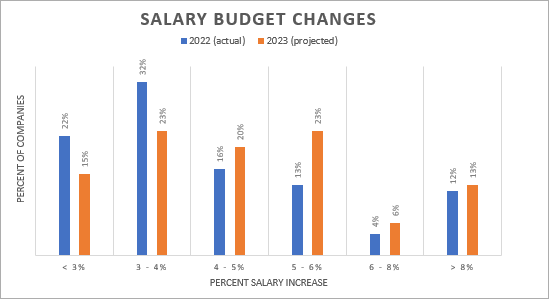
Over 60% of companies will increase salary budgets by 4% or more, while 13% will raise salary budgets by over 8%.
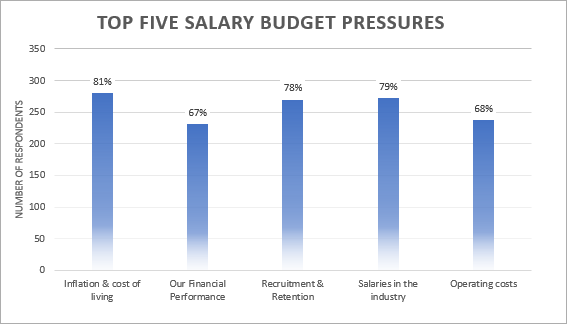
81% identified inflation and cost of living as a substantial salary budget pressure.
The reason is due to the unique state of the labor market. The survey found that 81% of companies saw inflation and cost of living as one of the top salary budget pressure points, followed closely by industry salaries (79%), recruitment and retention (78%), operating costs (68%) and financial performance (67%).
Most companies know that inflation pressure and stress are weighing more on exempt and non-exempt workers than officers and executives. The survey found that worker salaries are projected to increase by 4%—an 0.8% climb from 2021. Meanwhile, wages for officers and executives are projected to have a lesser increase of 0.5%, from 3.5% to 3%.
“The smartest move for most employers is to increase salary budgets for 2023, especially in light of this year’s high turnover rate,” says Victoria Kelleher, Lead Survey Specialist at XpertHR. “Employers need to stay competitive, especially with a high cost of living—the “Great Reshuffle” has proven that employees can and will find jobs elsewhere if salaries don’t suit their needs.”
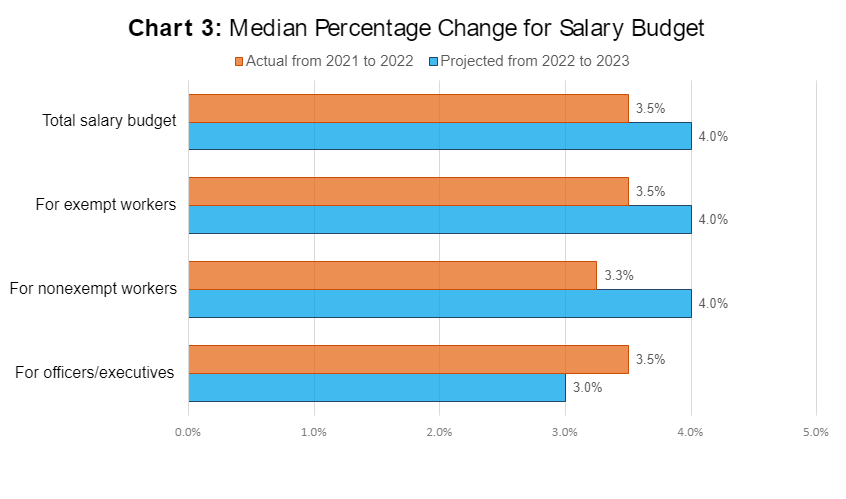
Exempt and non-exempt workers are projected to see their salaries increase to 4%, while officers and executives are projected to see a smaller increase of 3%.
While inflation and cost of living, industry salaries and recruitment and retention were the most indicated pressures, employers also felt the economy (66%), organizational salaries (57%) and, interestingly enough, pay equity efforts (56%) were other considerable upward pressures.
“We found that pay equity was moderately correlated with both salaries in the industry and within the organization, with no significant correlations between the other pressures,” says Kelleher. “This may suggest companies are using industry-wide data to inform pay equity initiatives, rather than just their own internal data.”
XpertHR’s 2023 Salary Budget Survey was conducted from September 14 to October 4, 2022. The survey included responses from 346 U.S. employers of various industries and workforce sizes. The survey report captures up-to-date projections for 2023 salary changes to assist employers in their salary budget decisions in the coming months, as well as the unique challenges employers are facing in their budget decisions this year, 2023 plans for bonuses, and compensation policies for remote workers.A complimentary press version of the report is available upon request.
About XpertHR:
XpertHR has been providing HR solutions since 2002, empowering organizations across the globe to build successful workforces and create a purposeful workplace for all. The platform delivers expert insight, trusted resources, data analysis and practical tools to help achieve greater efficiency, reduce risk, and increase employee engagement. XpertHR is developing smarter data analysis tools and cutting-edge technology to support future demands on HR in an increasingly digital world. To learn more, visit xperthr.com.
Contact Information
Name: Lauren Doyle
Email: ldoyle@wordsworthweb.com
Job Title: Communication Specialist
National Advertising Division Finds Certain HEPA Claims for Shark Air Purifiers Supported; SharkNinja Appeals Recommendation to Modify or Discontinue Others
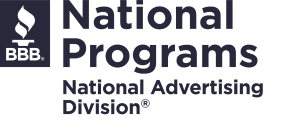
New York, NY – November 22, 2022 – In a challenge brought by Dyson, Inc., the National Advertising Division (NAD) of BBB National Programs determined that SharkNinja Operating LLC (Shark) provided a reasonable basis for claims that its Shark Air Purifier 4 meets or even exceeds HEPA standards but recommended that Shark discontinue these same claims for its Air Purifier 6.
The challenged claims include:
- “Capture 99.97% of dust, dander, odors, and more.”
- “Capture 99.98% of large, small, & micro-size particles.”
NAD also recommended that Shark:
- Discontinue claims that its air purifiers are better than other HEPA-labeled air purifiers because those purifiers leave behind pollutants.
- Discontinue its COVID-19 claims.
- Modify the “Clean Air 100%” claim by adding a clear and conspicuous disclosure explaining the basis of the claim.
Each of these filters is advertised as being a HEPA (high-efficiency particulate air) filter. HEPA filters are a type of pleated mechanical air filter that can remove at least 99.97% of dust, pollen, mold, bacteria, and any airborne particles with a size of 0.3 microns. HEPA filters can increase the air quality in a room over time and is often viewed as the gold standard in consumer-facing filtration products, such as air purifiers and vacuum cleaners.
HEPA Standards Claims
In support of Shark’s claims that its air purifiers meet or even exceed HEPA standards, the advertiser relied on testing conducted on the first batch of air filters from its production line (First Run Filters).
NAD considered whether the products being tested are representative of what consumers can purchase on the market and concluded that Shark’s testing of the First Run Filters was relevant for the Air Purifier 4. Further, NAD determined that the advertiser’s QC testing was reliable and was sufficient to provide a reasonable basis that its air filters, at least as of the time they left the production line overseas, met HEPA standards.
However, NAD concluded that, based on the challenger’s rebuttal testing of off-the-shelf filters for the Air Purifier 6 , Shark’s production line testing was insufficient to support its HEPA claims for such filters.
Comparative HEPA Claim
NAD assessed the messages reasonably conveyed by Shark’s claim that its filters are “True HEPA” whereas other “HEPA-labeled air purifiers can emit up to 10x more particles back into the air” and “can leave behind smoke, carbon dust, virus carriers, and mold.” These claims are made alongside images of Shark’s air purifier and what appears to be an unbranded air purifier. A small disclosure below the unbranded purifier states “Based on IEST-RP-CC007.3. 01-02 microns vs. a leading HEPA labeled air purifier.”
NAD determined that Shark’s comparison of its “True” HEPA purifiers to other purifiers, without identifying a specific purifier, directly pits Shark’s product against all “HEPA-Labeled Air Purifiers.” Although the disclosure does state that the “10X more particles” claim was based on a test against “a leading” purifier, the disclosure is tied only to the quantified 10X claims. NAD found that at least one message reasonably conveyed by the advertising is that Shark’s purifier is a “True HEPA” filter and other HEPA-labeled filters may be inferior.
Because Shark did not provide any support for the message that its purifiers are superior to 85% of the market or that 85% of competitors in the market, including Dyson, emit harmful particulates notwithstanding their HEPA-labeling, NAD recommended that the claim be discontinued.
NAD noted that nothing in its decision prevents Shark from educating consumers that some HEPA-labeled air purifiers may fall short of HEPA standards in a noncomparative context.
COVID-19 Claim
NAD determined that Shark’s claim “CAPTURES airborne droplets that can carry bacteria & viruses, such as CORONAVIRUS” reasonably communicates several messages, including that Shark’s air purifier:
- Captures (but does not kill) the coronavirus;
- Will prevent consumes from getting sick from the virus, either in part or completely; and
- Provides sufficient protection from becoming infected with COVID-19 that other protections are not necessary.
NAD noted that CDC guidance makes clear that solutions like HEPA air filters or cleaners are only part of a multi-layered approach to mitigate and reduce the risk of exposure to COVID-19 and is intended for use with numerous other precautionary practices. Because none of that context is present in Shark’s advertising, NAD recommended that Shark discontinue its COVID-19 claims.
NAD noted that nothing in its decision prevents Shark from claiming that air filters can be used as part of multiple mitigation strategies to reduce the spread of COVID-19 and lower the risk of exposure.
Clean Air 100% Claim
Shark advertises that its air purifiers offer “Clean Air 100%” by prominently displaying images of its purifier, which has a display known as Clean Sense IQ, with the numbers “100%” under the words “CLEAN AIR.”
NAD noted that none of Shark’s advertisements that contain the “Clean Air 100%” claim provide any explanation of what is meant by 100%.
A claim of 100% cleanliness is a powerful claim, and in the absence of context that clearly conveys the basis of the claim, NAD found that consumers may reasonably take away a literal message—that the air surrounding the purifier is 100% clean of any pollutants. Therefore, NAD recommended that Shark modify the claim by adding a clear and conspicuous disclosure explaining the basis of the 100% claim.
Finally, during the proceeding Shark voluntarily agreed to permanently discontinue the claim that its filters “capture 99.97% of odors.” Therefore, NAD did not review this claim on the merits.
In its advertiser statement, Shark stated that it “will appeal NAD’s decision.” The advertiser stated that while “it is pleased that NAD determined that Shark’s evidence demonstrated that its filters meet the HEPA standard when they left the production line” and that “Shark provided a reasonable basis for its HEPA claims for the Shark Air Purifier 4,” it “disagrees with NAD’s other findings and recommendations.”
Appeals of NAD decisions are made to BBB National Programs’ National Advertising Review Board (NARB), the appellate-level truth-in-advertising body of BBB National Programs.
All BBB National Programs case decision summaries can be found in the case decision library. For the full text of NAD, NARB, and CARU decisions, subscribe to the online archive.
About BBB National Programs: BBB National Programs is where businesses turn to enhance consumer trust and consumers are heard. The non-profit organization creates a fairer playing field for businesses and a better experience for consumers through the development and delivery of effective third-party accountability and dispute resolution programs. Embracing its role as an independent organization since the restructuring of the Council of Better Business Bureaus in June 2019, BBB National Programs today oversees more than a dozen leading national industry self-regulation programs, and continues to evolve its work and grow its impact by providing business guidance and fostering best practices in arenas such as advertising, child-directed marketing, and privacy. To learn more, visit bbbprograms.org.
About the National Advertising Division: The National Advertising Division (NAD) of BBB National Programs provides independent self-regulation and dispute resolution services, guiding the truthfulness of advertising across the U.S. NAD reviews national advertising in all media and its decisions set consistent standards for advertising truth and accuracy, delivering meaningful protection to consumers and leveling the playing field for business.
Contact Information
Abby Hills
Director of Communications
BBB National Programs
703.247.9330 / press@bbbnp.org
NAD Finds Certain Environmental Benefit Claims for ABA’s “Every Bottle Back” Initiative Supported; ABA Appeals Recommendation to Modify Other Claims
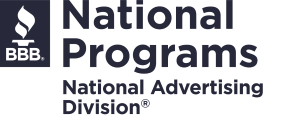
New York, NY – November 22, 2022 – The National Advertising Division (NAD) of BBB National Programs determined that the American Beverage Association (ABA) provided a reasonable basis for the following environmental benefit claims related to its Every Bottle Back program, which is designed to encourage and increase beverage container recycling in the U.S.:
- “Our bottles are made to be remade.”
- “We’re carefully designing our bottles to be 100% recyclable, including the caps.”
- The “That completes the circle” portion of the claim “That completes the circle and reduces plastic waste.”
- “Increasing awareness about the value of 100% recyclable plastic bottles.”
However, NAD recommended that ABA modify certain aspirational claims regarding the use of recycled materials in bottles, as well as claims relating to ABA’s partnerships with non-profit organizations and efforts to achieve sustainability goals together. ABA will appeal these portions of NAD’s decision.
The claims at issue, which appeared on ABA’s website and in a video advertisement, were challenged by NAD as part of its independent routine monitoring of truth and transparency in U.S. national advertising.
ABA is the trade association for the U.S. nonalcoholic beverage industry whose members are Coca-Cola Company, Keurig Dr Pepper, and PepsiCo. Consumers who are loyal to ABA’s brands care about environmental stewardship and cannot readily verify the truth and accuracy of environmental benefit claims.
Recyclability Claims
NAD assessed the evidence provided by the advertiser in support of claims that center on the recyclability of the bottles and further explain that the material is reused and recycled.
NAD determined that the claims “Our bottles are made to be remade” and “We’re carefully designing our bottles to be 100% recyclable, including the caps” are supported by a reasonable basis, including evidence that ABA member companies use 100 percent recyclable virgin plastic PET in their bottles and that some of its members are transitioning from the use of dark to clear plastic to make it more compatible with recycling processes and more likely to be reused.
NAD noted, however, that while PET is among the acceptable recyclable materials in the widely available recycling facilities nationwide, the claim “They’re collected and separated from other plastics so they can be turned back into material that we use to make new bottles” conveys the message that the bottles are recycled NAD found that the challenged claim does not make clear that this is a goal towards which the companies are working to achieve.
Further, regarding the “reduces plastic waste” part of the claim “That completes the circle and reduces plastic waste,” NAD found that while the ABA supported its recyclability claim, the evidence is less clear about a meaningful reduction in plastic waste even though the ABA provided evidence about efforts by its members to reduce total waste in their manufacturing practices.
For these reasons, NAD recommended that the advertiser modify its claims, “They’re collected and separated from other plastics so they can be turned back into material that we use to make new bottles” and “reduces plastic waste,” to better fit the evidence provided.
Increased Awareness of Recyclable Bottles
In support of its claim “Increasing awareness about the value of 100% recyclable plastic bottles,” the advertiser noted that aside from the advertising at issue in NAD’s inquiry, it has engaged in messaging on many digital platforms as well as recycling education programs (including at the community level) in the U.S. and several other countries that reached an estimated 28 million people. Based on this evidence, NAD determined that the claim was supported.
Reducing Plastic Footprint Claim
ABA’s claim, “Working with World Wildlife Fund through their ReSource: Plastic program to reduce our plastic footprint,” relates to its partnership with World Wildlife Fund (WWF), which in 2019 announced a goal of no plastic in nature by 2030 and the ReSource program would be the business partnership to achieve the goal. WWF uses its ReSource Footprint Tracker as the main analytical tool using a standard methodology to track the “plastic footprint” of companies that are members of its ReSource: Plastic program. NAD noted that “plastic footprint” is defined as “a measurement of the amount of plastic that someone uses and then throws away, considered in relation to the damage this causes the environment.”
NAD found that the reducing the footprint of ABA member companies claim is an objective claim that requires substantiation. NAD determined that the evidence provided was not a good fit to support the broad claim that ABA is reducing the plastic footprint of its member companies.
Therefore, NAD recommended that ABA modify the claim “Working with World Wildlife Fund through their ReSource: Plastic program to reduce our plastic footprint” to better fit the efforts and results of the partnership.
Modernizing Infrastructure Claim
Regarding ABA’s claim “Partnering with The Recycling Partnership and Closed Loop Partners to improve recycling access, provide education to residents and modernize the recycling infrastructure in communities across the country,” NAD inquired solely about ABA’s efforts to “modernize the recycling infrastructure in communities across the country.”
After reviewing the evidence, NAD found that ABA’s efforts are occurring in some communities in many states, but not broadly in communities across the country as the claim states. In addition, some of the progress, albeit noteworthy, does relate to some listed objectives, such as improving recycling access, but does not necessarily relate to infrastructure modernization (e.g., adding new recycling carts; education efforts).
Therefore, NAD recommended that the claim “partnering with The Recycling Partnership and Closed Loop Partners to improve recycling access, provide education to residents and modernize the recycling infrastructure in communities across the country” be modified to better reflect the recycling modernization efforts. NAD noted that nothing in its decision precludes the advertiser from touting its partnership with the Recycling Partnership and Closed Loop partners and benefits of those projects that are narrowly tailored to fit the evidence.
In its advertiser statement, ABA stated that it will appeal NAD’s “recommendations and interpretations that our advertisement overstates the extent to which our plastic bottles currently sold are made from recycled plastic and the efforts of our partnerships. These portions of NAD’s decision would limit our ability to effectively provide educational information about how the recycling system can work and inspire others to join us in striving toward our collection goals.”
Appeals of NAD decisions are made to BBB National Programs’ National Advertising Review Board (NARB), the appellate-level truth-in-advertising body of BBB National Programs.
All BBB National Programs case decision summaries can be found in the case decision library. For the full text of NAD, NARB, and CARU decisions, subscribe to the online archive.
About BBB National Programs: BBB National Programs is where businesses turn to enhance consumer trust and consumers are heard. The non-profit organization creates a fairer playing field for businesses and a better experience for consumers through the development and delivery of effective third-party accountability and dispute resolution programs. Embracing its role as an independent organization since the restructuring of the Council of Better Business Bureaus in June 2019, BBB National Programs today oversees more than a dozen leading national industry self-regulation programs, and continues to evolve its work and grow its impact by providing business guidance and fostering best practices in arenas such as advertising, child-directed marketing, and privacy. To learn more, visit bbbprograms.org.
About the National Advertising Division: The National Advertising Division (NAD) of BBB National Programs provides independent self-regulation and dispute resolution services, guiding the truthfulness of advertising across the U.S. NAD reviews national advertising in all media and its decisions set consistent standards for advertising truth and accuracy, delivering meaningful protection to consumers and leveling the playing field for business.
Contact:
Abby Hills
Director of Communications
BBB National Programs
703.247.9330 / press@bbbnp.org
Chicago Tech Company Announces Launch of Food Import Automation App
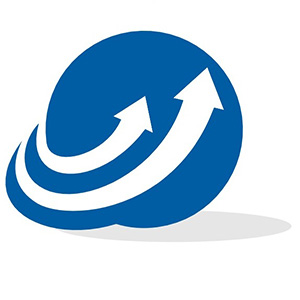
Chicago, IL: RudiCoder LLC, an e-commerce logistics company based in downtown Chicago, is pleased to announce the launch of PriorNotify, an e-commerce enabled application that automates the regulatory process for selling and shipping international food and beverages to customers in the USA.
“PriorNotify is a game-changer,” said Holly Urban, CEO and co-founder of RudiCoder. “If you sell or ship non-US American food and beverage products to customers in the USA, then you know how difficult and time-consuming the US American regulatory process can be. With our PriorNotify app, the process can be completed in seconds,” continued Urban.
PriorNotify is designed for food and beverage producers, as well as for merchants, distributors, drop shippers, and fulfillment and shipping services. International companies can now easily sell and ship edible products to US American retailers, distributors, and consumers.
PriorNotify offers seamless integrations with Shopify, WordPress (WooCommerce), Magento, PrestaShop, and WiX to automatically complete the regulatory process as soon as a product is purchased.
The app also works easily with any order management system, as well as online marketplaces like Amazon. Even without a direct integration, customer order information can be easily uploaded, allowing high-volume sellers to operate quickly and efficiently.
PriorNotify is built for e-commerce, and lets international producers, shipping and mailing companies, drop shippers, and other merchants easily work with each other.
For example, food or drink producers can automatically complete the regulatory process as soon as products are purchased from businesses that sell their products. Similarly, PriorNotify allows drop shippers to automatically notify their producers of each order, and automatically complete the regulatory process for each order, as soon as products are purchased. PriorNotify also allows shipping and mailing companies to automatically complete the regulatory process as soon as products are purchased from their customers.
PriorNotify also allows users to easily create commercial invoices. In addition, all PriorNotify app pages can be automatically translated into dozens of different languages.
“PriorNotify allows companies to effortlessly increase their product offerings, expand their sales and customer base in the USA, and drastically reduce their overhead expenses in the process,” Urban added.
Pricing is competitive with discounts as low as $0.10 per prior notice. There are no setup fees, no monthly minimum charge, no per-user fees, and no extra charges for preset product assortments. Free trials of PriorNotify are also available.
RudiCoder LLC is a food and beverage-focused e-commerce automation company based in downtown Chicago, IL, USA. For more on RudiCoder, please visit: RudiCoder.com and for PriorNotify: PriorNotify.com.
Contact Information
Name: Holly Urban
Email: hurban@incubatorllc.com
Job Title: CEO
Max Crowdfund Voted Best Crowdfunding Platform of 2022

Real Estate Crowdfunding Platform Wins Prestigious Cashcow Award
November 2022 Rotterdam – On the 4th November 2022, the Cashcow award winners were announced at the BeleggersFair in Amsterdam, the 8th edition of the largest investor event in the Netherlands. Max Crowdfund, with headquarters in Rotterdam, was crowned Best Crowdfunding Platform 2022 alongside category winners including Saxo Bank, ABN Amro and eToro.
Five organisations per category were nominated for the Cashcow awards and voted for by the general public and the financial community. Max Crowdfund was delighted to win first place in the category of Best Crowdfunding Platform.
“It is really rewarding to be acknowledged for all the progress that has been made within Max Crowdfund over the last year. We have huge plans for 2023 and will do everything to maintain the high standard of the existing platform as it grows,” said Max Crowdfund CEO, Felix Berkhout, at his award acceptance speech.
Max Crowdfund was represented at the BeleggersFair, held in the Beurs van Berlage, by CEO Felix Berkhout, who presented a masterclass on investing in real estate through crowdfunding alongside Marketing Manager Marc Bakker.
The fair attracted over 3200 attendees including delegates from the Dutch Financial Markets Authority (AFM). AFM board member Jos Heuvelman spoke on trends, developments and risk in the investment market.
In February 2022, Max Crowdfund was named fastest-growing crowdfunding platform in 2021 by market research company crowdfundingcijfers.nl after a tenfold increase of its transaction volume on the previous year. The amount of investment for real estate projects raised via Max Crowdfund grew by a further 500% over the last 12 months. To date, the platform has raised over €35 Million and is awaiting approval by the AFM for a European Crowdfunding Service Provider licence.
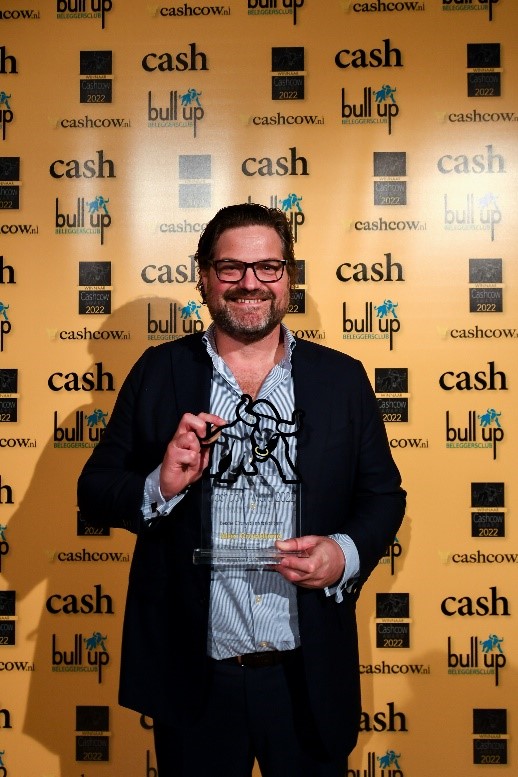
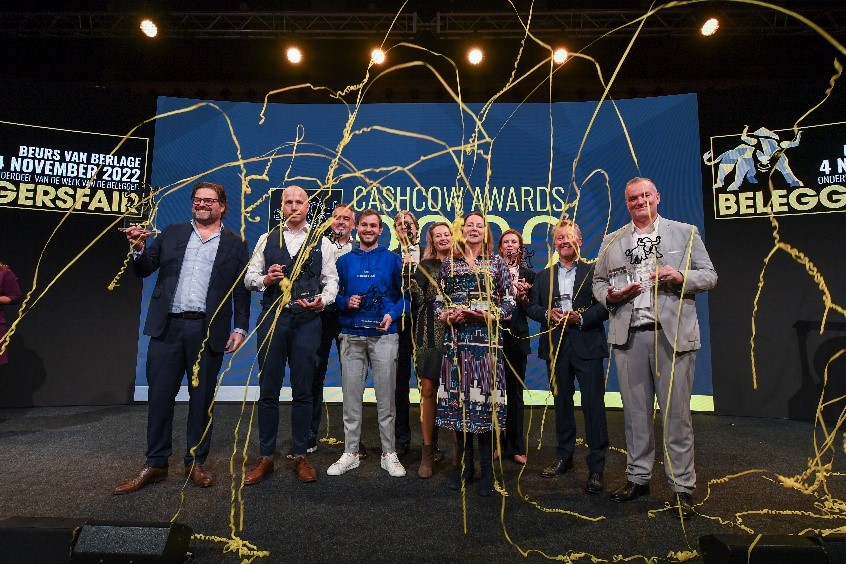
Contact Information
Name: Marc Bakker
Email: pr@maxcrowdfund.com
Job Title: Marketing Manager
National Advertising Division Recommends T-Mobile Modify or Discontinue Certain TV Commercial Claims for Magenta Max Wireless Service Plan
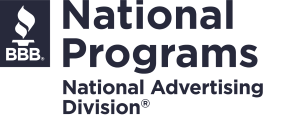
New York, NY – November 15, 2022 – The National Advertising Division (NAD) of BBB National Programs recommended that T-Mobile US, Inc. modify or discontinue certain claims for its Magenta Max mobile wireless service plan, including claims that:
- “You’ll get T-Mobile’s Price Lock Guarantee, they won’t raise the rates of your rate plan, ever” (the “Price Lock Guarantee” claim).
- “When you switch your family to T-Mobile Magenta Max, you can get up to $1,000.”
- “Families [with T-Mobile] save 20% versus AT&T.”
The claims at issue, which appeared in two T-Mobile television commercials (the “Please Listen” ad and the “Cumpleanos” ad), were challenged by competitor AT&T Services, Inc.
“Price Lock Guarantee” Claim
At issue for NAD was whether T-Mobile’s Price Lock Guarantee claim, as it appears in the Please Listen ad, clearly communicates to consumers that T-Mobile’s Price Lock Guarantee refers only to the monthly rate that consumers pay for wireless service under the Magenta Max plan and does not include associated taxes and fees.
NAD found that while customers are accustomed to advertised prices of goods being exclusive of sales tax, reasonable consumers may not understand the meaning of “price” within the context of the Price Lock Guarantee claim in the Please Listen ad as referring to the service’s monthly rate only and excluding fees and other taxes. Further, NAD determined that T-Mobile’s disclosure is not effective in limiting the claim both as a matter of presentation and content.
NAD determined that the Price Lock Guarantee claim was unsupported and recommended that T-Mobile discontinue the “Price Lock Guarantee” claim or modify it to avoid conveying such a message. NAD noted that nothing in its decision prevents T-Mobile from making a more limited claim that it will not increase the monthly rate under the Magenta Max plan for talk, text, and data services.
NAD also determined that T-Mobile’s Please Listen ad reasonably conveys the implied message that only AT&T and Verizon have recently imposed price hikes and fee increases on consumers for mobile wireless service. Because T-Mobile recently increased fees charged to consumers for mobile wireless service, NAD recommended that the commercial be modified to avoid conveying this unsupported message.
“Get up to $1,000 Back” Claims
Regarding the claim “when you switch your family to T-Mobile Magenta Max, you can get up to $1,000,” NAD considered whether the Please Listen and Cumpleanos ads make it clear that T-Mobile was offering switching customers $200 per line for up to five lines of service, or whether a reasonable consumer could take away the message that they are eligible for the full $1,000 regardless of the number of lines switched.
NAD found that both ads reasonably convey the message that a typical consumer who switches to T-Mobile’s Magenta Max plan is eligible to get $1,000. However, to the extent that the advertised offer can only be achieved by a certain class of consumer or under certain circumstances, the class of person or circumstances that can achieve the maximum level of performance claimed must be clearly and conspicuously disclosed.
Therefore, NAD recommended that the claim be modified to make it clear as part of the main claim, or in a similar font size in close proximity to the main claim, that the maximum amount advertised can only be attained by families switching five lines. Additionally, NAD recommended that the on-screen disclosures stating the material terms of the offer be modified to be clear, conspicuous, and easy to notice, read, and understand.
“Families with T-Mobile Save 20% Versus AT&T”
NAD considered whether T-Mobile’s 20% savings claim, in the context of its Cumpleanos ad, conveyed the broad message that all of T-Mobile plans offer a 20% savings over comparable wireless plans offered by AT&T, or whether it conveyed a more limited message that such savings are available with T-Mobile’s Essentials plan.
NAD determined that the Cumpleanos ad reasonably conveyed the message that consumers can save 20% when choosing T-Mobile plans over AT&T and Verizon plans and that the disclosure mentioning the Essentials Plan was not clear and conspicuous so as to limit the claim.
Additionally, NAD determined that because the Cumpleanos ad presents offers for the Magenta Max plan and the Essentials plan mere seconds apart, a consumer would reasonably understand these offers to be cumulative and not two completely distinct offers for two different plans. NAD found that the immediate proximity of the offers would reasonably convey the message that consumers would also save 20% with the Magenta Max plan as compared to AT&T
While the record established that consumers who switch 3-4 lines to Magenta Max can save 20% there was nothing in the record to support the broad 20% savings claim when choosing any T-Mobile plan over any AT&T and Verizon plans. NAD therefore recommended that the Cumpleanos ad be modified to avoid conveying such a message.
In its advertiser statement, T-Mobile stated that it “will comply with NAD’s decision.” The advertiser further stated that it is proud of its Price Lock guarantee and $1,000 switching offer and “believes the challenged advertisements appropriately communicated the terms of its offers and rate plan savings. T-Mobile nevertheless indicated that the challenged commercials are no longer running and that as a supporter of self-regulation, it “will take NAD’s recommendations into account with respect to its future advertising.”
All BBB National Programs case decision summaries can be found in the case decision library. For the full text of NAD, NARB, and CARU decisions, subscribe to the online archive.
About BBB National Programs: BBB National Programs is where businesses turn to enhance consumer trust and consumers are heard. The non-profit organization creates a fairer playing field for businesses and a better experience for consumers through the development and delivery of effective third-party accountability and dispute resolution programs. Embracing its role as an independent organization since the restructuring of the Council of Better Business Bureaus in June 2019, BBB National Programs today oversees more than a dozen leading national industry self-regulation programs, and continues to evolve its work and grow its impact by providing business guidance and fostering best practices in arenas such as advertising, child-directed marketing, and privacy. To learn more, visit bbbprograms.org.
About the National Advertising Division: The National Advertising Division (NAD) of BBB National Programs provides independent self-regulation and dispute resolution services, guiding the truthfulness of advertising across the U.S. NAD reviews national advertising in all media and its decisions set consistent standards for advertising truth and accuracy, delivering meaningful protection to consumers and leveling the playing field for business.
Contact Information
Name: Abby Hills
Email: press@bbbnp.org
Job Title: Director of Communications
Genexa Appeals NAD Recommendation to Discontinue or Modify Pediatrician Preference and Ingredient Claims for OTC Kids’ Pain & Fever Medicine
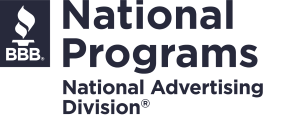
New York, NY – Nov. 14, 2022 – The National Advertising Division (NAD) of BBB National Programs recommended that Genexa Inc. discontinue certain pediatrician preference claims and ingredient claims for its over the counter (OTC) Kids’ Pain & Fever medicine. Genexa will appeal NAD’s decision.
The challenged claims appeared on the advertiser’s website, in social media posts, on physical point-of-sale displays, and in digital video advertising.
The claims were challenged by Johnson & Johnson Consumer, Inc., McNeil Healthcare Division, manufacturer of competing OTC pain and fever medications for children. Both parties’ products contain the active ingredient acetaminophen but differ in the formulation of their inactive ingredients.
At issue for NAD was whether the challenged pediatrician preference claims were supported by a survey of pediatricians (the FRC Survey) and whether the challenged ingredient claims, which contrast the advertiser’s product with other children’s OTC medications including formulations of Johnson & Johnson’s Children’s TYLENOL Pain + Fever Oral Suspension, were falsely disparaging.
Pediatrician Preference Claims
Johnson & Johnson challenged the following pediatrician preference claims:
- “Pediatricians prefer Genexa’s Kids’ Pain & Fever over Children’s Tylenol Pain + Fever liquid products for their own children based upon comparing the ingredients”; and
- “The doctors have spoken.”
Stepping into the shoes of a reasonable consumer, NAD found that one message conveyed by the challenged claims is that the pediatricians prefer the advertiser’s product and not that such preference is limited to “ingredients.” NAD also found that another reasonable consumer message conveyed is that pediatricians recommend the advertiser’s product in their own practices and use it to treat their own children. NAD determined that the advertiser’s FRC survey was not a good fit for the challenged claims.
NAD recommended that the claims be discontinued or modified to make clear that the surveyed pediatricians expressed a preference only as to “ingredients.” NAD further recommended that the advertiser avoid stating or implying that pediatricians prefer or use the advertiser’s product over the challenger’s product in their practices or for their own children.
Ingredient Claims
NAD has recognized that there is a distinction between claims that underscore a product’s claimed benefit versus claims that state or reasonably imply that other products are unsafe or pose potential risks or dangers.
NAD found that the following challenged claims convey the message to a reasonable consumer that there are ingredients in competitors’ products, including Johnson & Johnson’s, that are dangerous and unsafe by indicating that the ingredient is in or made from products that would be harmful if ingested.
Because there was no evidence in the record to support claims that the FDA-approved non-active ingredients in competitors’ products, including Children’s TYLENOL, are harmful or unhealthy, NAD recommended that these claims be discontinued.
NAD also recommended that the advertiser discontinue the “MADE WITH REAL INGREDIENTS” claim in the context presented in the now discontinued video advertisement and avoid conveying the message that competing products with different inactive ingredients are generally unsafe, harmful, or dangerous. NAD noted that nothing in its decision prevents the advertiser from highlighting the “real ingredients” in its product provided, however, that the advertising does not otherwise convey the message that competing products contain inactive ingredients that are generally unsafe, harmful, or dangerous.
NAD determined that several remaining ingredient claims did not constitute mere puffery, but instead compared Genexa’s products to competitor’s products in a measurable way such that substantiation for the claims is required.
Therefore, NAD recommended that the advertiser discontinue the following claims in the context in which they appear in the challenged advertising:
- “When we looked around the medicine aisle, we found something that made us sick.”
- “Your kid’s pain medicine shouldn’t give you a headache.”
- “Things that shouldn’t exist, with a list of items like “showers that make you dirty,” “food that makes you hungry,” “all artificial dyes in medicine,” and “parabens in medicine.”
Finally, the advertiser informed NAD that it had previously discontinued the use of four additional claims “EWWW,” “SERIOUSLY?!,” “JUST WOW . . ..” “Ditch the dirty,” and “#pediatricianapproved” prior to the date of the challenge. During the challenge, the advertiser advised NAD and the Challenger that it permanently discontinued these claims. Therefore, NAD did not review these claims on the merits.
In its advertiser statement, Genexa stated that it will appeal NAD’s decision. The advertiser stated that although it is “pleased that NAD found that the FRC Survey supported an ingredient-based preference claim (e.g. ‘Pediatricians prefer the ingredients in Genexa’s Kids’ Pain & Fever over Children’s Tylenol Pain + Fever liquid products for their own children’)” and that “nothing in NAD’s decision prevents Genexa from highlighting the ‘real ingredients’ in its product,” it “fundamentally disagrees with the balance of NAD’s decision,” including the recommendations to modify or discontinue the challenged claims.
Appeals of NAD decisions are made to BBB National Programs’ National Advertising Review Board (NARB), the appellate-level truth-in-advertising body of BBB National Programs.
All BBB National Programs case decision summaries can be found in the case decision library. For the full text of NAD, NARB, and CARU decisions, subscribe to the online archive.
About BBB National Programs: BBB National Programs is where businesses turn to enhance consumer trust and consumers are heard. The non-profit organization creates a fairer playing field for businesses and a better experience for consumers through the development and delivery of effective third-party accountability and dispute resolution programs. Embracing its role as an independent organization since the restructuring of the Council of Better Business Bureaus in June 2019, BBB National Programs today oversees more than a dozen leading national industry self-regulation programs, and continues to evolve its work and grow its impact by providing business guidance and fostering best practices in arenas such as advertising, child-directed marketing, and privacy. To learn more, visit bbbprograms.org.
About the National Advertising Division: The National Advertising Division (NAD) of BBB National Programs provides independent self-regulation and dispute resolution services, guiding the truthfulness of advertising across the U.S. NAD reviews national advertising in all media and its decisions set consistent standards for advertising truth and accuracy, delivering meaningful protection to consumers and leveling the playing field for business.
Contact Information
Name: Abby Hills
Email: press@bbbnp.org
Job Title: Director of Communications
